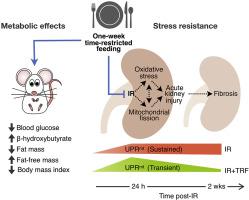当前位置:
X-MOL 学术
›
Free Radical Bio. Med.
›
论文详情
Our official English website, www.x-mol.net, welcomes your feedback! (Note: you will need to create a separate account there.)
Protection against renal ischemia and reperfusion injury by short-term time-restricted feeding involves the mitochondrial unfolded protein response.
Free Radical Biology and Medicine ( IF 7.4 ) Pub Date : 2020-05-04 , DOI: 10.1016/j.freeradbiomed.2020.04.025 Pedro Rojas-Morales 1 , Juan Carlos León-Contreras 2 , Jessica Granados-Pineda 3 , Rogelio Hernández-Pando 2 , Guillermo Gonzaga 4 , Laura Gabriela Sánchez-Lozada 4 , Horacio Osorio-Alonso 4 , José Pedraza-Chaverri 3 , Edilia Tapia 4
Free Radical Biology and Medicine ( IF 7.4 ) Pub Date : 2020-05-04 , DOI: 10.1016/j.freeradbiomed.2020.04.025 Pedro Rojas-Morales 1 , Juan Carlos León-Contreras 2 , Jessica Granados-Pineda 3 , Rogelio Hernández-Pando 2 , Guillermo Gonzaga 4 , Laura Gabriela Sánchez-Lozada 4 , Horacio Osorio-Alonso 4 , José Pedraza-Chaverri 3 , Edilia Tapia 4
Affiliation

|
Food restriction improves metabolic health and increases resistance to stress in experimental animals. However, most studies have focused on long-term dietary restriction protocols consisting of several weeks or months of limited food ingestion. Here it was investigated the impact of 2-h time-restricted feeding (TRF) for one week on stress resistance in a rat model of kidney injury induced by ischemia and reperfusion (IR). At baseline, TRF reduced blood glucose, increased β-hydroxybutyrate and improved body composition in male Wistar rats. Importantly, implementing the one-week TRF schedule before ischemia significantly improved renal function, suppressed tubular injury, prevented the activation of extracellular signal-regulated kinase 1/2 (ERK1/2) and inhibited the development of interstitial fibrosis. These benefits were related to increased antioxidant protection, reduction in dynamin-related protein 1 (DRP1)-mediated mitochondrial fragmentation and modulation of the mitochondrial unfolded protein response (UPRmt). Specifically, preoperative TRF boosted the activation of the UPRmt in the acute phase after renal IR while promoted its resolution at the stage of fibrosis. Our study indicates that dietary preconditioning by short-term TRF improves the outcome of renal IR injury, and suggests that an optimal intervention that promotes kidney protection may not necessarily require adherence to restrictive diets for prolonged periods of time.
中文翻译:

通过短期限时喂养防止肾脏缺血和再灌注损伤涉及线粒体未折叠蛋白反应。
食物的限制改善了代谢健康,并增加了实验动物对压力的抵抗力。但是,大多数研究都集中在长期饮食限制方案上,这些方案包括数周或数月的有限食物摄入。在这里,研究了在缺血和再灌注(IR)致肾损伤的大鼠模型中,持续2小时限时喂食(TRF)1周对应激抵抗的影响。在基线时,TRF降低了雄性Wistar大鼠的血糖,增加了β-羟基丁酸酯并改善了身体组成。重要的是,在缺血前实施为期一周的TRF方案可显着改善肾功能,抑制肾小管损伤,防止细胞外信号调节激酶1/2(ERK1 / 2)的活化并抑制间质纤维化的发展。这些好处与增强抗氧化剂保护,减少动力相关蛋白1(DRP1)介导的线粒体片段化和调节线粒体未折叠蛋白应答(UPRmt)有关。具体而言,术前TRF促进了肾IR后急性期UPRmt的活化,同时促进了纤维化阶段的UPRmt分解。我们的研究表明,通过短期TRF进行饮食预处理可以改善肾IR损伤的结果,并表明促进肾脏保护的最佳干预措施不一定需要长期坚持限制性饮食。术前TRF促进了肾IR后急性期UPRmt的活化,同时在纤维化阶段促进了UPRmt的分解。我们的研究表明,通过短期TRF进行饮食预处理可以改善肾IR损伤的预后,并表明促进肾脏保护的最佳干预措施不一定需要长期坚持限制性饮食。术前TRF促进了肾脏IR后急性期UPRmt的激活,同时在纤维化阶段促进了UPRmt的分解。我们的研究表明,通过短期TRF进行饮食预处理可以改善肾IR损伤的预后,并表明促进肾脏保护的最佳干预措施不一定需要长期坚持限制性饮食。
更新日期:2020-05-04
中文翻译:

通过短期限时喂养防止肾脏缺血和再灌注损伤涉及线粒体未折叠蛋白反应。
食物的限制改善了代谢健康,并增加了实验动物对压力的抵抗力。但是,大多数研究都集中在长期饮食限制方案上,这些方案包括数周或数月的有限食物摄入。在这里,研究了在缺血和再灌注(IR)致肾损伤的大鼠模型中,持续2小时限时喂食(TRF)1周对应激抵抗的影响。在基线时,TRF降低了雄性Wistar大鼠的血糖,增加了β-羟基丁酸酯并改善了身体组成。重要的是,在缺血前实施为期一周的TRF方案可显着改善肾功能,抑制肾小管损伤,防止细胞外信号调节激酶1/2(ERK1 / 2)的活化并抑制间质纤维化的发展。这些好处与增强抗氧化剂保护,减少动力相关蛋白1(DRP1)介导的线粒体片段化和调节线粒体未折叠蛋白应答(UPRmt)有关。具体而言,术前TRF促进了肾IR后急性期UPRmt的活化,同时促进了纤维化阶段的UPRmt分解。我们的研究表明,通过短期TRF进行饮食预处理可以改善肾IR损伤的结果,并表明促进肾脏保护的最佳干预措施不一定需要长期坚持限制性饮食。术前TRF促进了肾IR后急性期UPRmt的活化,同时在纤维化阶段促进了UPRmt的分解。我们的研究表明,通过短期TRF进行饮食预处理可以改善肾IR损伤的预后,并表明促进肾脏保护的最佳干预措施不一定需要长期坚持限制性饮食。术前TRF促进了肾脏IR后急性期UPRmt的激活,同时在纤维化阶段促进了UPRmt的分解。我们的研究表明,通过短期TRF进行饮食预处理可以改善肾IR损伤的预后,并表明促进肾脏保护的最佳干预措施不一定需要长期坚持限制性饮食。



























 京公网安备 11010802027423号
京公网安备 11010802027423号